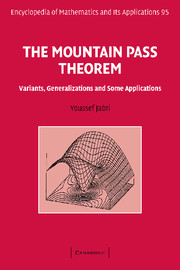Book contents
- Frontmatter
- Contents
- Introduction
- 1 Retrospective
- I First Steps Toward the Mountains
- II Reaching the Mountain Pass Through Easy Climbs
- III A Deeper Insight in Mountains Topology
- 9 The Limiting Case in the MPT
- 10 Palais-Smale Condition versus Asymptotic Behavior
- 11 Symmetry and the MPT
- 12 The Structure of the Critical Set in the MPT
- 13 Weighted Palais-Smale Conditions
- IV The Landscape Becoming Less Smooth
- V Speculating about the Mountain Pass Geometry
- VI Technical Climbs
- A Background Material
- Bibliography
- Index
13 - Weighted Palais-Smale Conditions
Published online by Cambridge University Press: 04 September 2009
- Frontmatter
- Contents
- Introduction
- 1 Retrospective
- I First Steps Toward the Mountains
- II Reaching the Mountain Pass Through Easy Climbs
- III A Deeper Insight in Mountains Topology
- 9 The Limiting Case in the MPT
- 10 Palais-Smale Condition versus Asymptotic Behavior
- 11 Symmetry and the MPT
- 12 The Structure of the Critical Set in the MPT
- 13 Weighted Palais-Smale Conditions
- IV The Landscape Becoming Less Smooth
- V Speculating about the Mountain Pass Geometry
- VI Technical Climbs
- A Background Material
- Bibliography
- Index
Summary
Plus ça change, plus c'est la même chose.
[The more that changes, the more it's the same.]
Alphonse Kaar, reported in Dictionnaire des citations de langue française by P. Ripert, Bookking International, Paris, 1995When nonlinear problems have a variational structure but do not present enough compactness to use the MPT in its classical form, we have to study carefully the behavior of the Palais-Smale sequence for the inf max level in the statement of the MPT. In this chapter, we will review some of the results that refined the MPT to treat this situation. We will discuss some variants of the MPT where “weighted” Palais-Smale conditions, weaker than the classical one, appear. Then, we will see a very interesting procedure, attributable to Corvellec [257], for deducing new critical point theorems with weighted Palais-Smale conditions from older ones with the standard Palais-Smale condition just by performing a change of the metric of the underlying space X.
In many nonlinear problems with a variational structure, the standard methods of calculus of variations, including the MPT, do not apply in a direct way because of lack of compactness.
Technically, the lack of compactness (failure of (PS)) arises when dealing, for example, with semilinear elliptic problems on the whole space Ω = ℝN, or even on a bounded domain Ω but with p = 2* = 2N/(N - 2) for N ≥ 3, the embedding of H1 (Ω) in Lp(Ω) being no more compact.
- Type
- Chapter
- Information
- The Mountain Pass TheoremVariants, Generalizations and Some Applications, pp. 149 - 160Publisher: Cambridge University PressPrint publication year: 2003



